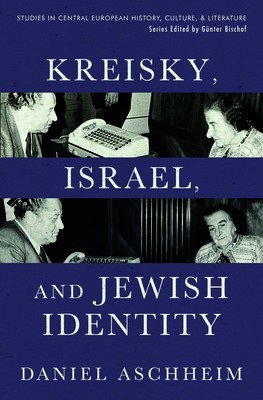
- We will send in 10–14 business days.
- Author: Daniel Aschheim
- Publisher: University of New Orleans Press
- ISBN-10: 1608012425
- ISBN-13: 9781608012428
- Format: 14 x 24.8 x 1.4 cm, minkšti viršeliai
- Language: English
- SAVE -10% with code: EXTRA
Reviews
Description
The personal and professional life of Bruno Kreisky (1911-1990), Austria's long-serving Socialist chancellor from August 1970 to May 1983, has been the focus of many books and articles. However, his ambiguous and complex relationship to his Jewishness, the State of Israel, and Zionism, as well as his connections to his overall political project and global aspirations, remain only partially researched. This book studies and analyzes these more systematically and comprehensively and places Kreisky in a comparative perspective with other twentieth-century European Jewish politicians who attained similar pinnacles of power. At the same time, the book will show that Bruno Kreisky was among the most influential and controversial political leaders since World War II.
The book revolves around understanding and illuminating the myriad ways in which Kreisky's Jewishness was--or was not--a formative factor in his treatment of "Jewish" questions within Austrian politics, Austrian-Israeli relations, and his active engagement in Middle Eastern affairs. This deeper understanding mainly emerges through examining Kreisky's actions during several pivotal events like the Kreisky-Peter-Wiesenthal affair, the Waldheim affair, the 1973 Marchegg incident, and his overall relationship to Zionism, the State of Israel, and the Palestinian Arab world.
This book is not a comprehensive biography of Kreisky. Instead, it attempts to document and place Kreisky's fraught engagement with his Jewishness and the related sensitive issues that touched upon it in a historical, political, ideological, and personal context. This mainly comes down to the entangled and always-ambiguous politics of identity, especially his understanding of his Jewishness.
- Author: Daniel Aschheim
- Publisher: University of New Orleans Press
- ISBN-10: 1608012425
- ISBN-13: 9781608012428
- Format: 14 x 24.8 x 1.4 cm, minkšti viršeliai
- Language: English English
The personal and professional life of Bruno Kreisky (1911-1990), Austria's long-serving Socialist chancellor from August 1970 to May 1983, has been the focus of many books and articles. However, his ambiguous and complex relationship to his Jewishness, the State of Israel, and Zionism, as well as his connections to his overall political project and global aspirations, remain only partially researched. This book studies and analyzes these more systematically and comprehensively and places Kreisky in a comparative perspective with other twentieth-century European Jewish politicians who attained similar pinnacles of power. At the same time, the book will show that Bruno Kreisky was among the most influential and controversial political leaders since World War II.
The book revolves around understanding and illuminating the myriad ways in which Kreisky's Jewishness was--or was not--a formative factor in his treatment of "Jewish" questions within Austrian politics, Austrian-Israeli relations, and his active engagement in Middle Eastern affairs. This deeper understanding mainly emerges through examining Kreisky's actions during several pivotal events like the Kreisky-Peter-Wiesenthal affair, the Waldheim affair, the 1973 Marchegg incident, and his overall relationship to Zionism, the State of Israel, and the Palestinian Arab world.
This book is not a comprehensive biography of Kreisky. Instead, it attempts to document and place Kreisky's fraught engagement with his Jewishness and the related sensitive issues that touched upon it in a historical, political, ideological, and personal context. This mainly comes down to the entangled and always-ambiguous politics of identity, especially his understanding of his Jewishness.


Reviews